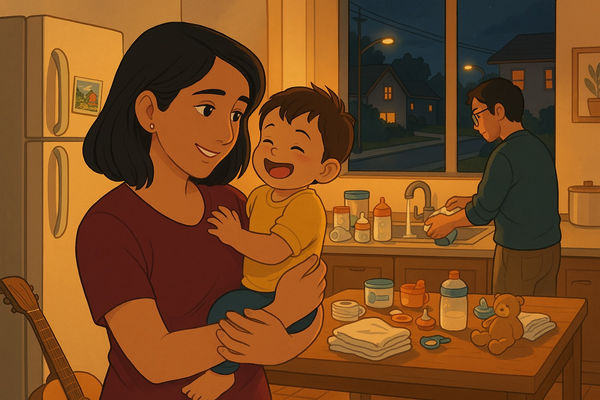Her story matters

Story #4
- the one who redefined her ambitions
Ashmita
Consultant, Boston
*This story is based on a recorded conversation. It has been lightly edited for clarity and flow, with direct quotes preserved to reflect the speaker’s voice.
My Story
“I think… I can talk about two categories of aspirations. Career-wise, I’ve always been very driven, very workaholic. I just assumed I could continue the way I’ve always been, and keep rising in the company or whatever work I was doing.”
She pauses, then adds:
“But after becoming a mom, I realized taking care of a human being is a lot more responsibility… It’s conflicting because you want your career to grow at the pace you want, but you also need to prioritize other responsibilities. So yeah, the aspirations shift a little bit timeline-wise… or maybe they just shift. They become less. At least I became less aggressive.”
She smiles lightly.
“My aspirations haven’t died. But they’ve shifted.”

Q 2 : How did it feel to make those changes in your life goals? Was it difficult?
“I won’t lie—yes, sometimes you regret. You miss that freedom… to pick up your bag and go for a meeting, to manage your schedule the way you want. And in this competitive world, when it comes to career, you need flexibility. You need to be available. And you’re not able to do that as much—especially with a kid.”
Still, she reflects,
“There are also feelings of happiness, of taking care of a young child, someone you’re grooming, mentoring. It’s a privilege as well.”
But the need for support is clear:
“At this stage—I’m in my 30s—I still have a lot of drive and motivation. And I wish I had more help. More support. More resources. So that I could have that sense of flexibility to pursue my career the way I wanted to.”
Q 3 : Were there things you had to give up after becoming a mom?
“I used to play guitar. We even have a drum set, a ukulele, and a regular acoustic guitar at home. But now they just sit there. I haven’t picked them up in years.”
She sighs.
“Exercise, too. That used to be part of my routine. Now, not so much. When time is limited, you choose to spend it with your child—and personal time disappears. That’s just the reality.”
“You give up things that brought you joy—music, movement, self-expression. And that takes a toll on you, sometimes even in the form of guilt.
Q 4 : You mentioned guilt earlier. Can you talk more about that?
“My relationship with guilt has been complicated. It’s deeply ingrained—cultural conditioning that expects mothers to take on everything.”
“I grew up in India. My mom worked full-time, but she still did most of the childcare, the cooking, the organizing. I saw that and internalized it. I just assumed that’s what being a mom looks like.”
“Even with a supportive partner who shares the load, the guilt persists. If I came home late or missed a significant moment in my child’s life, it weighed heavily on me.”
“I remember I had to go on a one-week work trip when my son was two. When I came back, he didn’t want to talk to me. He clung to his dad. I felt like I broke our bond. I cried. I thought, ‘Did I fail as a mother?’”
“The thing is… society idolizes mothers, but it doesn’t support them. It expects perfection without help.”

Q 5 : What was your support system like?
“I’m an immigrant. No extended family. No long-time friends nearby. Just me and my husband. We’re on our own.”
“In Asia, you often have relatives helping, neighbors who check in. Here? You’re on your own. I miss that. I crave that.”
“Sometimes I think—if only there was a community of women I could lean on, just for an hour or two.”
Q 6: Has motherhood changed you?
“Yes. It made me stronger. More efficient. More emotionally intelligent.”
“My son is very social—very different from me. But he brings out the social side of me. I’ve grown because of him.”
“Now, give me 20 things—I’ll finish all 20. Planning, multitasking, anticipating… they’ve become part of who I am.”
Q 7:What would you tell other mothers—or your younger self?
“Find your identity beyond being a mom. It doesn’t have to be tied to a job. It can be a hobby, a ritual, or just time to yourself.”
“Communicate clearly with your partner. Ask for what you need. Don’t try to do everything alone. And forgive yourself when things slip.”
“I’m still learning. Still adjusting. Still dreaming. Being a mother is only one of the many roles I play.”




